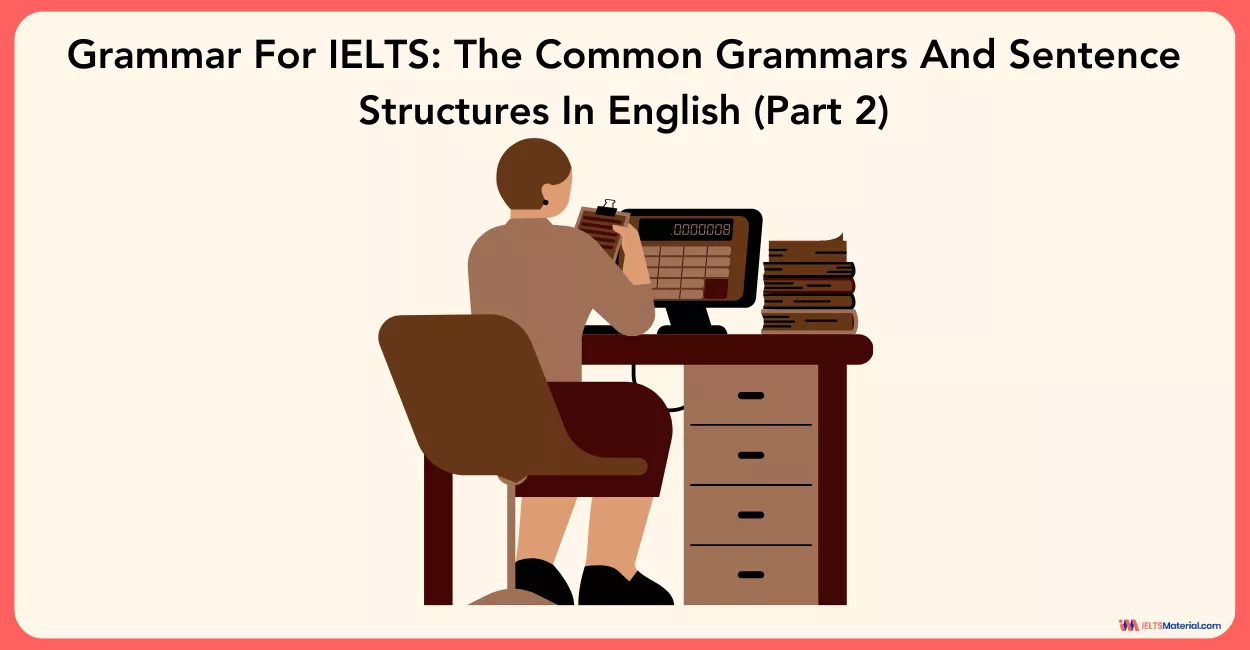Grammar For IELTS: The Common Grammars And Sentence Structures In English (Part 2)
Boost your IELTS Writing and Speaking with essential grammar structures. This blog (Part 2) explains common English patterns, such as “to be good at,” “give up,” and “had better,” with examples, helping you communicate accurately & naturally.
Table of Contents

Limited-Time Offer : Access a FREE 10-Day IELTS Study Plan!
Grammar plays a vital role in achieving a high band score in the IELTS test. Beyond academic grammar, everyday English structures are equally important. They not only make your sentences more natural but also help improve fluency in Writing and Speaking.
This guide explores some of the most common IELTS Grammar structures and expressions in English, with examples to help you use them effectively in your IELTS preparation and can boost your IELTS Exam performance.
Useful Grammar Structures for IELTS
1. To Be Good At / Bad At + Noun or Verb-ing
Use this structure to describe strengths or weaknesses in activities or skills.
Examples:
- She is very good at playing tennis.
- I am bad at English.
2. By Chance = By Accident
This expression means something happened unexpectedly or unintentionally.
Examples:
- I met this dog quite by accident.
- The pilot, whether by chance or design, made the plane do a sharp turn.
Want to improve your grammar? Get the newly launched IELTS Grammar book today!
3. To Be / Get Tired Of + Noun or Verb-ing
Use this when something becomes boring or annoying.
Examples:
- I was getting tired of doing a lot of Math homework.
- She is tired of watching television.
4. Can’t Stand / Help / Bear / Resist + Noun or Verb-ing
This pattern expresses when you cannot stop yourself from doing something.
Examples:
- I just can’t resist pizza.
- She can’t help leaving the hospital right now.
5. To Be Keen On / To Be Fond Of + Noun or Verb-ing
This is used when you are enthusiastic about an activity or hobby.
Examples:
- I am very keen on travelling.
- She was keen on reading books.
6. To Be Interested In + Noun or Verb-ing
Expresses curiosity or a desire to know more about something.
Examples:
- Because I am really interested in economics, I decided to apply for the University of Economics.
- My father is interested in chess, so he wants to enrol in this course.
Feeling stuck with IELTS Grammar? Register for our webinar and unlock your potential today!
7. To Waste + Time / Money + Verb-ing
Used when time or money is spent in a way that is not productive.
Examples:
- My younger brother wastes a lot of money playing video games.
- She is wasting her time finding the answer.
8. To Spend + Time / Money + Verb-ing or On + Noun
This structure describes how you use your time or money.
Examples:
- I spend 1 hour swimming.
- She is spending all of her money on fashion.
9. To Give Up + Verb-ing / Noun
Means to stop doing something, especially something done regularly.
Examples:
- Jack has decided to give up basketball at the end of this season.
- After much advice, she gave up her dream of becoming a singer.
10. Would Like / Want / Wish + To-Infinitive
Use this structure to express desires or preferences.
Examples:
- I would like to come to this EDM party.
- My mother wishes to visit England.
11. Have + Something + To + Verb
Indicates possession of something for a specific purpose.
Examples:
- I have a laptop to help me write the essay.
- She had a dog to watch her house.
12. It + Be + Something / Someone + That / Who
Used to emphasize a specific detail in a sentence.
Examples:
- It is Jack who called you last night.
- It is the dog that I saw in her house.
Struggling with grammar for the IELTS? Sign up for our online class & master the words to succeed!
13. Had Better + Verb (Infinitive)
Similar to “should,” it expresses strong advice or necessity.
Examples:
- You had better go to the hospital.
- She had better have a healthy diet.
14. Common Verbs Followed by Verb-ing
Certain verbs are always followed by the -ing form.
Examples:
- I usually practise listening to English every day.
- She postpones writing the conclusion for her essay.
15. It’s + Adjective + To + Verb (Infinitive)
Use this to describe situations with adjectives.
Example:
-
It’s difficult to get a high score.
Explore our IELTS eBook store for top-rated books curated by experts. Buy now & elevate your IELTS preparation!
These common grammar structures are practical tools to express yourself naturally and accurately in IELTS. By mastering them, you can improve both your Writing and Speaking performance. Use them in practice essays and speaking tests to gain confidence and improve your overall band score. For those aiming for top scores, following the IELTS Exam Preparation Tips for Band Score of 8+ can further enhance your vocabulary and overall test performance.
Also Check:
- 10 Useful IELTS Speaking Tips to Impress the Examiner
- Linking Words for IELTS Speaking Section
- Top 11 IELTS Vocabulary Books
- Using Contrast in IELTS Speaking & Writing: Advanced Grammar in IELTS
- 100+ Advanced Vocabulary Word List for IELTS (PDF Available)
- Especially vs Specially for IELTS Grammar: Lessons, Examples, Usage & Exercises

Start Preparing for IELTS: Get Your 10-Day Study Plan Today!
Recent Articles

Nehasri Ravishenbagam

Prity Mallick

Kasturika Samanta





Post your Comments